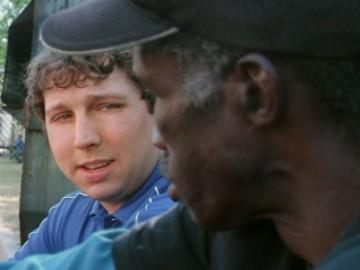
Section Branding
Header Content
Students Screen Homeless For Mental Illness
Primary Content

Outside the Salvation Army shelter in down town Augusta a line of homeless men begins to form along the sidewalk. It’s nearly 30 degrees and they have arrived early in the hopes of getting food and a bed for the night.
A small group of medical students armed with clipboards tries to engage the men in conversation. They want to find out if any of them show signs of mental illness. One of the students is James Gable. He's been scouring Augusta shelters for the past two years
"We see pretty much the entire gamut of psychiatric disorders from schizophrenics to bipolar disorder to depression," said Gable.
Gable uses a simple survey once he has a willing participant. There isn't much time and the questions are short and to the point like “have you ever seen things that aren’t there?” and “have you ever been depressed for weeks at a time?”
He says for people answering ‘yes’ to many of the questions he and his colleagues will make mental health appointments and give out free bus tickets to get there. The program is funded by a yearlong grant from the American Psychiatric Foundation.
"We just look for people who need that treatment and then refer them on to the professionals who can decide if they need medication or not," Gable said.
One of the men standing in line at the shelter is Isaac Hill. Last year he ended up homeless after quitting a construction job at the Savannah River Site. Recently Hill was screened and found that he had mild depression.
"I talked to a few folks and I did receive some help," he said. "I didn’t need the medication but I think that anybody that goes through something as traumatic as that would show some traits of needing help."
Because the screening is voluntary the process is slow going.
Gable says it takes about 6 months to screen a little more than 100 people.
Today many of the men waiting to get into the shelter either don’t want to participate or have already been screened.
Hill was the only one who agreed to be interviewed for this story.
But there is progress. Gable and his colleagues estimate about half of the people screened get outpatient care.
Recently MCG istarted bringing in new doctors and staff to Augusta's East Central Georgia Regional psychiatric hospital. It's part of a federally mandated overhaul of the state’s mental health facilities. The move helped the state reach a settlement with the U.S. Department of Justice after it sued over conditions in state mental hospitals. The DOJ said too many people were dying because there wasn’t enough staff.
Tom Wilson is a spokesman for Georgia’s newly created Department of Behavioral Health and Developmental Disabilities.
He says MCG’s work with the homeless goes hand in hand with state efforts to refocus treatment of mental illness from inpatient care in state hospitals to outpatient care in the community.
"We’ll be providing supporting housing as well as employment because one of the most important things for someone to be able to sustain recovery with a mental illness is to have steady employment and a place to live and to be able to contribute to their community," said Wilson.
Georgia’s branch of the advocacy group National Alliance on Mental Illness says addressing mental illness at homeless shelters could mean fewer people ending up institutionalized in psychiatric hospitals. The group says that means less strain on the state’s mental health system.
Outside the shelter Isaac Hill is still waiting to escape the cold. He says he hopes the MCG screening program can help the state improve its treatment of the mentally ill.
"In my view it’s a direct measurement of our societal righteousness," he said. "A civilized people is judged upon how they treat the helpless."
Hill says he’s well on his way to getting himself off the streets after dealing with his depression.
Tags: homeless, Medical College of Georgia, mental health, East Central Georgia Regional Hospital, Department of Behavioral Health and Developmental Disabilities, Tom Wilson, Georgia mental health care, James Gable, Salvation Army, homeless shelter, psychiatric care
